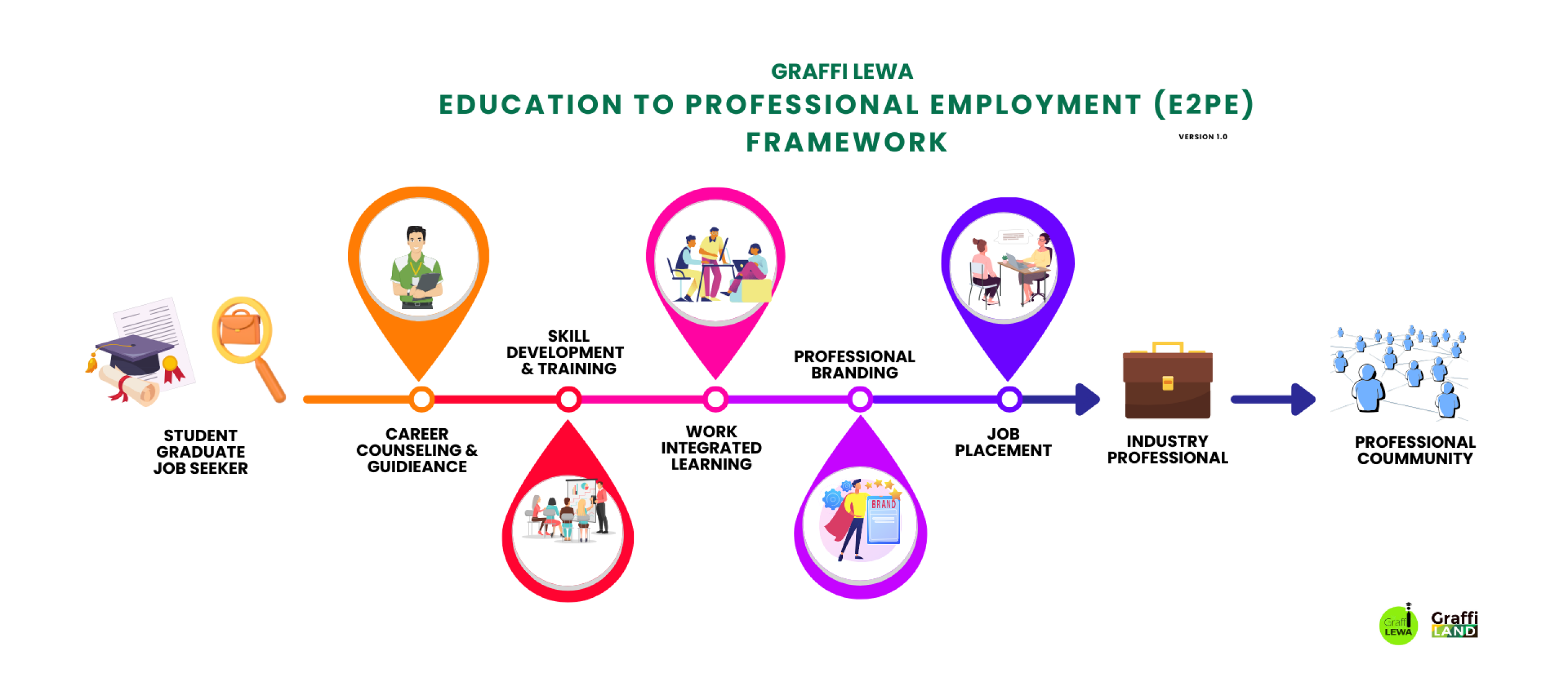Education To Professional Employment Framework

Target Audience
The comprehensive framework primarily caters to professinal training institutions seeking to equip graduates with the indispensable knowledge and skills necessary for a successful transition into gainful employment upon completion of their studies
What this Framework does not do
This framework is NOT a replacement of formal education like Universityes, colleges but a supplement to help transition graduates to employment in a quick and effective way.
Stages of the Education-to-Employment Framework
Career Counselling and Guidance: A significant number of gradiates are unaware of the breadth of opportunities that await them, given their unique skill sets. Some may have pursued degrees in one field (Degree A) but possess transferable skills applicable to another (Job B). Moreover, exceptional academic achievements may not necessarily align with the high-demand skills sought by the current job market. Hence, this pivotal stage entails a comprehensive evaulation of students’ motivations, acquired skills, and educational knowledge, skillfully matching them with career profiles that are in sync with the present job market landscape. The desired outcome of this phase is the development of customized career profiles that effectively align graduates’ skills and interests with the prevailing needs of the job market.
Skills Development and Training: Acknowledging the inherent diversity among graduates, we advocate for tailored training packages that cater to individual needs. These packages should adhere to stringent standards of quality and emphazise the pursuit of courses, programs, and industry certifications offered by globally recognized institutions or platforms. Such a strategic approach empowers trainees to compete not only at the local level but also on the international stage. To bridge the gap between theoritical knowledge and real-life application, we strongly endorse active involvement of industry professionals throghout the training process. Ideally, this phase should span a period of three to six months, culminating in candidates equipped with the requisite skills and knowledge necessary to thrive in the contemporary job market.
Work-Integrated Learning: In today’s job market, the expectation of prior job experience is pervasive, even for entry-level positions. Thus, trainees must actively seek internships or engage in group projects that align with their chosen career paths. However, the selection of internships or projects should be guided by a purposeful approach, focusing on the specific challenges encountered in the trainees fields of interest.
Professional Branding: The art of presenting oneself effectively in the job market cannot be overstated. This phase centers on the artful creation of well-structured curriculum vitae (CV) or resume documents that expertly highlight candidates suitability for their desired positions. Furthermore, we strongly advocate for the establishment of a commanding online presence on reputable job search platforms, including LinkedIn, Indeed, and Glassdor. Candidates can further distinguish themselves by curating a perosnal blog that showcases their noteworthy projects and accomplishments. Complementing these efforts, comprehensive training on CV/resume writing and job interview preparations ensures candidates emerge with polished professional profiles, poised to make a lasting impression in the job market.
Job placement: This phase entails practive pursuit of job opportunities that resonate with candidates interests and aspirations. Recognizing that each job requirement is unique, candidates must meticulously tailor their CVs or resumes to align with the specific demands of each position. Thoroughly understanding job descriptions before application submission is paramount to enhancing efficacy. While the job application, interview process, and subsequent job placement can be time-consuming, perseverance, authenticity, and trust in one’s abilities ultimately yield rewarding outcomes as candidates secure positions within companies that appreciate their distinct skills and knowledge.
The Education to Employment framework recognizes that education and training should be directly linked to the needs of the labor market. By fostering collaboration between professinal institutions and industries, the E2PE framework aims to enhance the employability of graduates and reduce skills gap in the work force.
Graffiland
30/07/2023